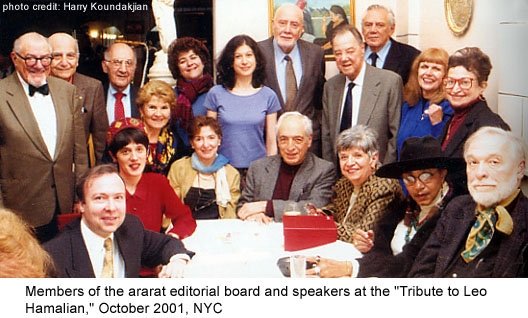I’ve been thinking of Leo Hamalian lately. Perhaps it’s because the tenth anniversary of his passing is approaching. Or maybe it’s because as the launch of my third novel nears, I’m remembering my earliest professional publications. Leo was a distinguished and prolific writer, educator and editor. He served as the editor of ARARAT Literary Quarterly from 1972 until 2003. In 2001, I was invited to join a roster of speakers, including Peter Balakian, Diana Der Hovanessian and Peter Sourian, at a celebration of Leo’s career. Below are the words I offered at the time.
~
This is the scene. As I was driving my father’s car up Lincoln Street in Watertown, I, Nancy Kricorian, waved hello to a little neighborhood boy and somehow ran into a parked car. The parked car, it turned out, belonged to Paul Moushigian, who had graduated high school two years ahead of me. When the police officer got out of his cruiser to fill out the accident report he and Paul shook hands. They knew each other. The cop’s name was Eddie Bakarian. It turned out that Eddie Bakarian had gone to high school with my father, Eddie Kricorian. It was an Armenian thing. We’d be able to work it out.
What you might ask, does this anecdote have to do with Leo Hamalian? There is a circuitous connection. Because I grew up in Watertown, Massachusetts in the Armenian community, I had learned from my father that when you needed anything—a fixture installed, a TV repaired, a summer job—you should contact an Armenian. Now, there were instances that this didn’t work out quite the way one hoped. There was the shady Armenian house painter that disappeared with all the money when only half the house had been painted, for example. But to counter this were dozens of happy stories, like the one involving the gracious Paul Moushigian and helpful Eddie Bakarian.
This is where we get to Leo Hamalian. When I was in the Graduate Writing Program at Columbia, I decided to start sending my poems to literary magazines. That was the way you launched a literary career as a poet. Following my father’s dictum, the first place I sent my poems was ARARAT Literary Quarterly. I thought, surely, the Armenian journal would take my somewhat Armenian-themed work.
What I didn’t think to know was that the Armenian-American editor at the Armenian-American journal had a calling and devotion much greater than simply being nice to people with –ian at the end of their names. His calling was to continue and to nurture the highest traditions of Armenian-American literature and culture, and his devotion was to the writers who came to him, often, as I did, little knowing what a huge impact his spirit and intelligence would have on us. He didn’t just publish Armenian-American writers; he grew them. For me, he did so many kind deeds that I am embarrassed to list them. But rather than get all sentimental, I’ll read from two other writers of my generation who have their own saccharine things to say about Leo.
This from Michael Zadoorian, whose fabulous novel SECOND HAND was published to critical acclaim by W.W. Norton: “Leo Hamalian was one of the first people to believe in me as a fiction writer. Even when he had to reject stories that I submitted to ARARAT, Leo always had something kind to say. The fact that Leo treated me like a professional writer helped me to believe it myself.”
And this from Chris Bohjalian, the best-selling author of such excellent novels as the Oprah-anointed MIDWIVES: “One thing I will cherish about Leo is his monumental generosity. There are few human beings on this planet not related to me by marriage or blood who are as relentlessly supportive and encouraging of my work as a writer—and in fact of so very, very many writers.”
Thank you, Leo, from me and from all the other writers whose talents you have cherished and nurtured not because we were neighborhood kids or vaguely your cousins, but because of your commitment to something greater—the collective work you inspired in us all.
Nancy Kricorian
Speech from A Festive Tribute to Leo Hamalian Upon His 30th Anniversary as Editor of ARARAT Literary Quarterly (Sunday, October 28, 2001)
January 5, 2013
